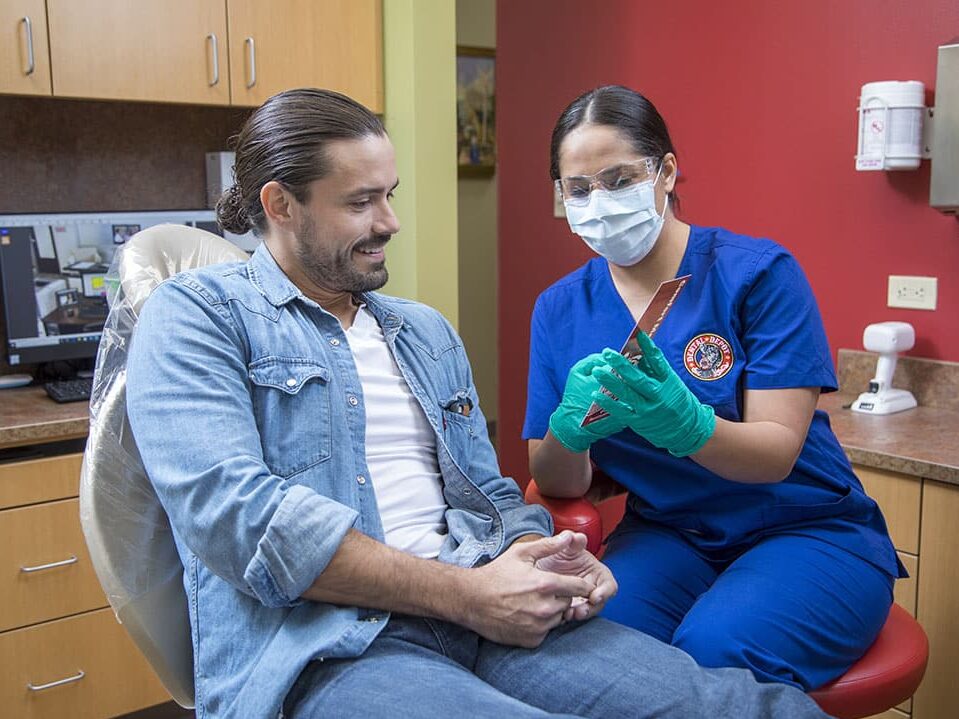At Dental Depot, we understand the significance of wisdom teeth removal. Wisdom teeth, or third molars, are usually the last teeth to emerge in your mouth.
In certain situations, wisdom teeth may be healthy but still require removal due to orthodontic treatment. In other instances, wisdom teeth can become impacted or only partially erupt, leading to misalignment. Impacted or partially impacted wisdom teeth can cause swelling, pain, and even infection in the surrounding gum, as well as exert pressure on adjacent teeth, potentially causing permanent damage to healthy teeth and the surrounding bone.
Occasionally, impacted or partially impacted wisdom teeth can contribute to the development of cysts or, in more severe cases, tumors, which could potentially destroy a section of your jaw.
Finally, fully erupted wisdom teeth may need removal because they are difficult to clean and susceptible to severe decay. For these reasons, it can be a wise decision to have your wisdom teeth removed.

Dental Depot is dedicated to educating and guiding our patients in Phoenix, Mesa, Peoria, and Surprise, Arizona, ensuring they make the best oral health choices for their loved ones and themselves. Our team is passionate about keeping you in the loop regarding everything from the care you receive to suitable payment options tailored for your budget. You’re always encouraged to call or set up a meeting with our amiable team members to address any queries or concerns.
At Dental Depot, we’re determined to provide everyone in Phoenix, Mesa, Peoria, and Surprise with the cost-effective and accessible care they deserve, encompassing essential services like wisdom teeth extraction. With several locations across these regions, a Dental Depot clinic is always within reach, ensuring you and your family maintain radiant, confident, and healthy smiles throughout your lives.
Regardless of whether your dentist or a specialist performs the wisdom tooth removal, the procedure remains consistent:
Initially, a local anesthetic is administered to ensure a comfortable experience. In some cases, your doctor may choose to supplement the anesthetic with nitrous oxide gas or opt for a general anesthetic to induce complete unconsciousness.
Once the area is numb, the extraction process commences. A dental instrument known as an elevator is employed to gently wiggle the tooth within its socket.
After the tooth has been loosened, it is removed using forceps. In more complex cases, a surgical handpiece may be employed to assist with the tooth extraction.
As with most procedures, tooth extraction carries certain risks and potential complications. Be aware that there is a small chance of infection, discomfort, extended bleeding, dry socket, or loosening of adjacent teeth and their fillings or crowns. In rare instances, an upper tooth may become displaced into the sinus. Additionally, though extremely uncommon, jaw fracture and temporary or permanent numbness are also possible.
There isn’t a one-size-fits-all solution; however, if your dentist recommends removing your wisdom teeth due to potential issues, it’s generally better to do so sooner rather than later. This suggestion stems from the fact that younger individuals tend to heal more quickly. The risk of persistent numbness, jaw fracture, or other complications also increases with age. Moreover, delaying the removal of a problematic wisdom tooth can lead to further complications in the future.
Schedule an appointment to receive guidance on wisdom teeth removal!
